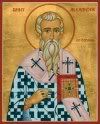For if reason is not associated with being, then being is not associated with reason, is alogical. Illusionism and all kinds of nihilism, which end in flaccid and pitiful skepticism, are then inevitable. The only way out of this quagmire of relativity and conditionality is the recognition that reason is associated with being and that being is associated with reason. And if that is the case, the act of knowing is not only a gnoseological but also an ontological act, not only ideal but also real. Knowing is a real going of the knower out of himself, or (what is the same thing) a real going of what is known into the knower, a real unification of the knower and what is known. … Considered within me (according to the mode 'I'), 'in itself,' this 'entering into' is knowledge. 'For another' (according to the mode 'Thou'), it is love. Finally, 'for me,' as objectifies and objective (i.e., according to the mode 'He'), it is beauty. In other words, perceived in me by another, my knowledge of God is love of the one who perceives. Contemplated objectively, by a third, love of another is beauty.
St. Pavel (Florensky)
Saturday, March 04, 2006
Knowledge according to love
Subscribe to:
Post Comments (Atom)


No comments:
Post a Comment